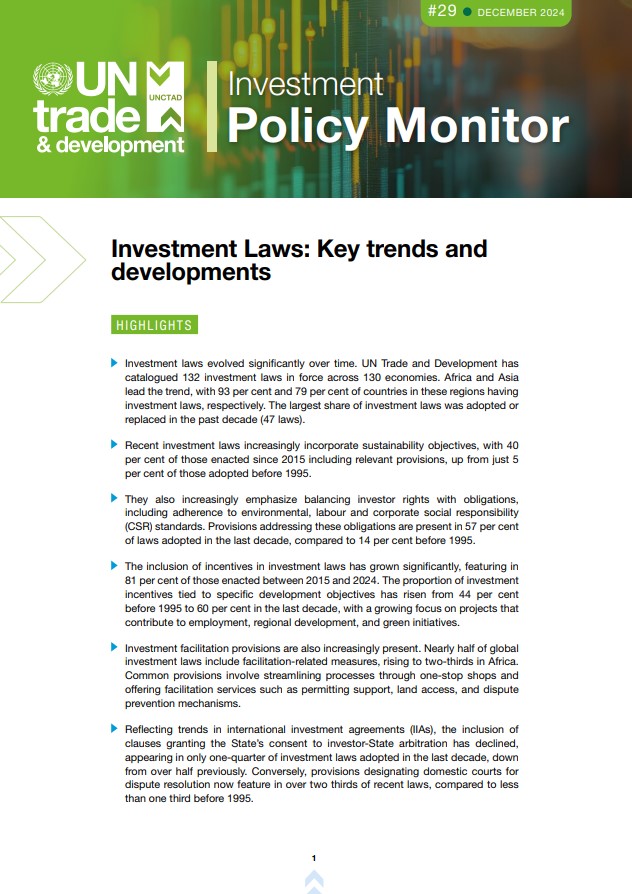Investment Policy Monitor, Issue No 29: Investment Laws: Key trends and developments
UN Trade and Development has released its latest Investment Policy Monitor (No. 29) , on Investment laws: key trends and developments. Based on the analysis of the investment laws catalogued in the Investment Laws Navigator , the Monitor highlights the significant evolution of investment laws over the past decades, to align with changing national and international policy priorities and challenges. Key findings include:
- Investment laws are in force across 130 economies. Africa and Asia lead the trend, with 93 and 79 per cent of countries in these regions having investment laws, respectively. The largest share of investment laws was adopted or replaced in the past decade (47 laws).
- Recent investment laws increasingly incorporate sustainability objectives, with 40 per cent of those enacted since 2015 including relevant provisions, up from just 5 per cent of those adopted before 1995.
- They also increasingly emphasize balancing investor rights with obligations, including adherence to environmental, labour and corporate social responsibility standards. Provisions addressing these obligations are present in 57 per cent of laws adopted in the last decade, compared to 14 per cent before 1995.
- The inclusion of incentives in investment laws has grown significantly, featuring in 81 per cent of those enacted between 2015 and 2024. The proportion of investment incentives tied to specific development objectives has risen in the last decade, with a growing focus on projects that contribute to employment, regional development, and green initiatives.
- Investment facilitation provisions are also increasingly present. Nearly half of global investment laws include facilitation-related measures, rising to two-thirds in Africa. Common provisions involve streamlining processes through one-stop shops and offering facilitation services such as permitting support, land access, and dispute prevention mechanisms.
- Reflecting trends in international investment agreements, the inclusion of clauses granting the State’s consent to investor-State arbitration has declined, appearing in only one-quarter of investment laws adopted in the last decade, down from over half previously. Conversely, provisions designating domestic courts for dispute resolution now feature in over two thirds of recent laws, compared to less than one third before 1995.
Looking ahead, the continued evolution of investment laws and the reform of old laws will be key to addressing emerging challenges such as climate change, technological disruption, and shifting economic landscapes. Policymakers should prioritize the development of adaptive frameworks that not only attract investment but also align with sustainable development goals and ensure equitable benefits for host economies. UN Trade and Development stands ready to assist policymakers in this process.
















